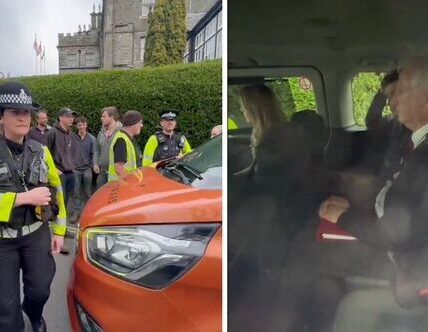Defence Secretary John Healey issues update on plans for a ‘Coalition of the Willing’ to keep the peace in Ukraine

Britain is ready to send troops to Ukraine (Image: Getty)
The UK is ready to send British soldiers to Ukraine to “reinforce” a ceasefire with Russia, Defence Secretary John Healey said. Prime Minister Sir Keir Starmer and French President Emmanuel Macron will today hold talks with other countries that have joined a “Coalition of the Willing” to preserve the peace in Ukraine if Russia’s invasion ends.
France and the UK are expected to provide the bulk of the military force, although the plan also requires support from the US. And Mr Healey told Times Radio this would mean British soldiers being sent to Ukraine. He was asked: “Does it still include the possibility of sending troops to Ukraine to support a ceasefire?” Mr Healey said: “Yes. The prime minister has always been clear that he’s ready to put troops into Ukraine to help reinforce a ceasefire.”

Zelenskyy visits Keir Starmer in Downing Street earlier this year (Image: Getty)
There had been reports that the UK had abandoned plans to send a peace-keeping force to Ukraine because of US President Donald Trump’s reluctance to support the proposal, but the Defence Secretary’s comments show the idea has not been abandoned,
Mr Macron is in the UK on a state visit, and the British and French leaders will hold online talks with other world leaders later today.
The Defence Secretary also said that a force of 50,000 troops will be created to defend Europe, as the UK and France step up military co-operation.
The Franco-British summit today will discuss the two countries’ means of deterrence “in the face of extreme threats” in Europe, Mr Healey said.
Asked about the 37th Franco-British summit to take place at Downing Street on Thursday, Mr Healey told Sky News: “It’s the first summit with a European ally since the end of Brexit, which is quite extraordinary, but it demonstrates the way that as a Government, we set out this last year to reset relations with key European allies.
“And France has always been our longest-standing ally.
“We’re close on military co-operation, so we’ll be announcing new co-ordination on nuclear co-operation, on research, on exercising, (and) on testing and co-ordinating our deterrence in the face of extreme threats that our countries in Europe may face…”
Mr Healey added the two nations will discuss increased co-operation of their militaries with a view to create “a force of 50,000 ready to activate to defend Europe”.
It was announced today that Britain and France are to order more Storm Shadow missiles, as they step up work to replace the weapon as part of a refreshed defence pact.
Storm Shadow, or as the French call it SCALP, is a long-range missile which has been supplied by both the British and French to Ukraine, allowing Kyiv to strike targets deep inside Russian territory.
The two countries have discussed co-operation on a replacement for years but, as French president Emmanuel Macron visits the UK, the nations will commit to the next phase of the project for Storm Shadow’s successor.
The joint development will help to sustain more than 1,300 jobs in the UK, according to the Government.
On the third day of Mr Macron’s UK state visit today, he and Sir Keir Starmer will also agree to deepen nuclear ties.
Britain and France, the only two nuclear powers in Europe, will state in a declaration that their nuclear deterrents – while independent – can be co-ordinated, with the aim of deterring threats like Russia from attacking Europe.
The declaration comes at a time when Donald Trump’s US administration is calling on European Nato powers to take on a larger role in the alliance.
Prime Minister Sir Keir Starmer said: “From war in Europe, to new nuclear risks and daily cyber-attacks – the threats we face are multiplying.
“As close partners and Nato allies, the UK and France have a deep history of defence collaboration and today’s agreements take our partnership to the next level.
“We stand ready to use our shared might to advance our joint capabilities – equipping us for the decades to come while supporting thousands of UK jobs and keeping our people safe.”


